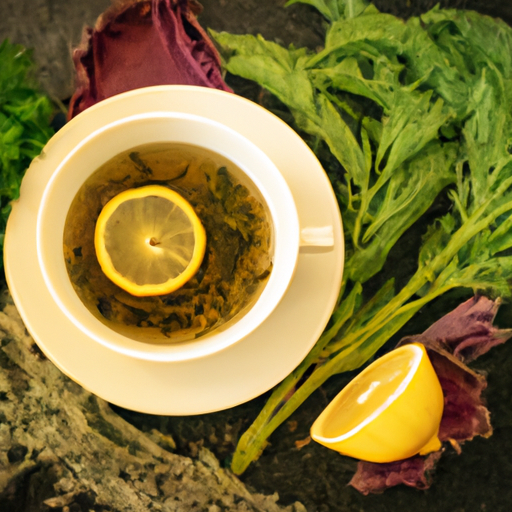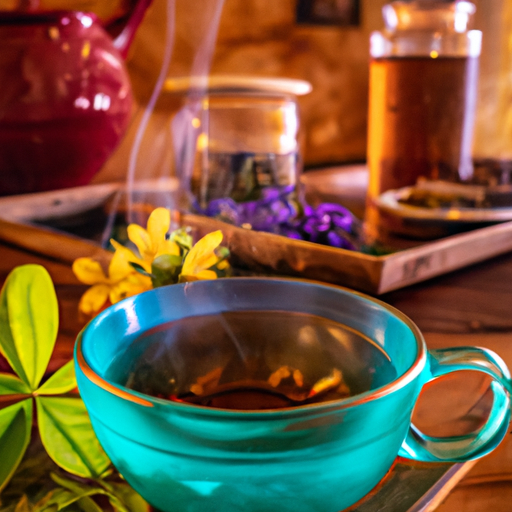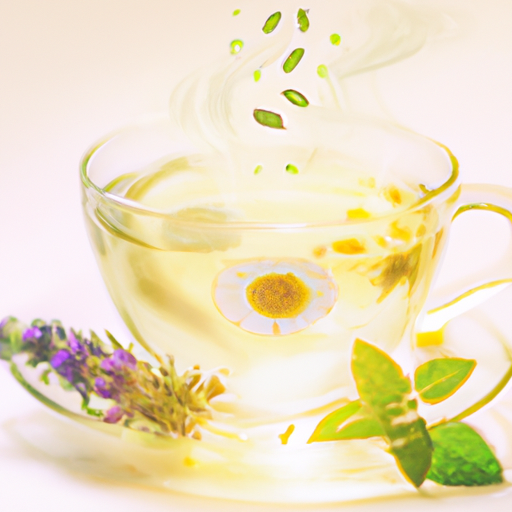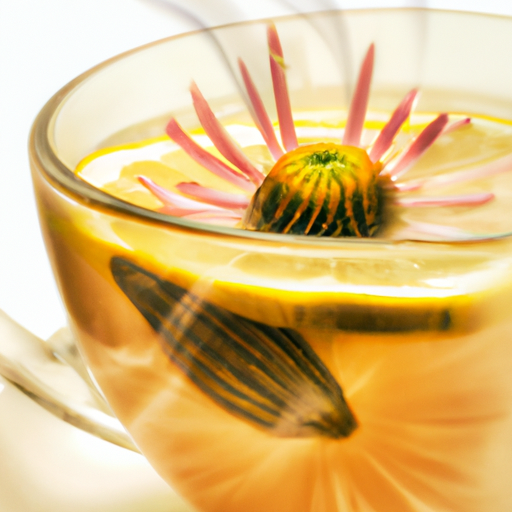Are you tired of suffering from calcium oxalate stones? Do you want to find a natural and effective way to prevent them from forming? Look no further than herbal tea.
Yes, you heard me right – herbal tea can be the solution you’ve been searching for. In this article, I will reveal the incredible benefits of herbal tea and how it can be an alternative to regular tea for those who form calcium oxalate stones.
But before I do, let me build up some suspense. Did you know that regular tea contains high levels of oxalates? These oxalates can contribute to the formation of calcium oxalate stones, causing immense pain and discomfort.
But fear not, because herbal tea is here to save the day. By incorporating herbal tea into your daily routine, you can reduce your risk of developing these painful stones and embrace a healthier, stone-free lifestyle.
So, let’s dive in and discover the wonders of herbal tea together.
Key Takeaways
- Herbal tea can be a beneficial alternative to regular tea for individuals who form calcium oxalate stones.
- Some beneficial herbal teas for calcium oxalate stone formers include dandelion root tea, nettle leaf tea, and chamomile tea.
- Herbal teas have various health benefits, such as acting as diuretics, inhibiting crystallization of calcium oxalate, and having anti-inflammatory properties.
- It is important to consult with a healthcare professional or dietitian and monitor the body’s response to herbal tea consumption.
Understanding Calcium Oxalate Stones
If you’ve ever wondered why those pesky calcium oxalate stones keep forming, we’ve got the answer for you. Understanding risk factors is crucial in preventing these painful stones from recurring.
Calcium oxalate stones are formed when oxalate, a natural compound found in certain foods, combines with calcium in the urine. Some people are more prone to forming these stones due to various risk factors. One common risk factor is a diet high in oxalate-rich foods, such as spinach, rhubarb, and nuts. Other risk factors include dehydration, high salt intake, obesity, and certain medical conditions like hyperparathyroidism.
By identifying and addressing these risk factors, you can reduce the likelihood of forming calcium oxalate stones. In the subsequent section, we will explore the benefits of herbal tea as an alternative to regular tea for those who form calcium oxalate stones. Incorporating herbal tea into your daily routine may help prevent stone formation.
The Benefits of Herbal Tea
Indulging in a steaming cup of herbal goodness can be a soothing and refreshing way to reap the numerous benefits it offers. Herbal tea not only provides a delightful flavor experience but also brings various health benefits to the table.
One of the main advantages of herbal tea is its natural composition, which makes it a great alternative for those who form calcium oxalate stones. Unlike regular tea, herbal tea is free from oxalates, reducing the risk of stone formation.
Moreover, herbal teas come in a wide range of flavors, allowing you to explore and find your favorite blend. From calming chamomile to invigorating peppermint, there is a flavor variation for every palate.
Additionally, herbal tea is known for its medicinal properties. Many herbal teas possess anti-inflammatory and antioxidant properties, which can boost your immune system and promote overall well-being. For example, ginger tea has been shown to aid digestion and reduce inflammation, while green tea is rich in antioxidants that may help prevent chronic diseases.
Transitioning to the subsequent section about herbal tea options for calcium oxalate stone formers, it is important to understand the specific herbal teas that are beneficial for preventing stone formation.
Herbal Tea Options for Calcium Oxalate Stone Formers
Explore a world of flavorful and stone-preventing options with herbal teas specifically curated for individuals susceptible to calcium oxalate stone formation. Herbal tea benefits extend beyond their delicious taste, as they offer a variety of health advantages. For those prone to forming calcium oxalate stones, certain herbal teas can provide a natural alternative to regular tea. These options can help reduce the risk of stone formation by minimizing oxalate levels in the body.
Some herbal teas that are particularly beneficial for calcium oxalate stone formers include dandelion root tea, nettle leaf tea, and chamomile tea. Dandelion root tea acts as a diuretic, promoting increased urine production and flushing out excess oxalates. Nettle leaf tea contains compounds that inhibit the crystallization of calcium oxalate in the kidneys. Chamomile tea, on the other hand, possesses anti-inflammatory properties that can help alleviate any discomfort associated with stone formation.
By incorporating these herbal teas into your daily routine, you can take proactive steps towards preventing calcium oxalate stone formation while enjoying a refreshing and flavorful beverage.
Transitioning into the subsequent section, let’s explore how to incorporate herbal tea into your everyday life.
Incorporating Herbal Tea into Your Daily Routine
When it comes to incorporating herbal tea into my daily routine, I’ve found that the brewing method and tips are crucial for achieving the best flavor and benefits.
I like to experiment with different brewing techniques, such as steeping the tea for the recommended time and using the right water temperature. To enhance the flavor, I often add a squeeze of lemon or a touch of honey.
Lastly, I pay attention to the timing and frequency of my consumption, making sure to enjoy a cup or two throughout the day without overdoing it.
Brewing Methods and Tips
To brew a perfect cup of herbal tea, start by steeping the tea bag in hot water for a few minutes until it releases its aromatic flavors, just like a blooming flower opening up to reveal its vibrant petals.
Here are some brewing techniques and flavor profiles to enhance your herbal tea experience:
- Experiment with different water temperatures to find the perfect balance of flavor.
- Steep the tea for the recommended time to avoid a bitter taste.
- Use fresh, filtered water for a cleaner and more vibrant taste.
- Consider using a tea infuser or tea ball for loose leaf herbal teas.
- Don’t forget to gently stir the tea to ensure an even infusion of flavors.
By following these simple brewing methods, you can create a delightful cup of herbal tea that suits your taste preferences.
Now, let’s explore how to enhance the flavor with additions.
Enhancing the Flavor with Additions
Discover the secret to transforming your cup of herbal tea into a flavor-packed sensation that will leave your taste buds begging for more. One way to enhance the flavor of your herbal tea is by adding various ingredients. Flavored herbal teas are a popular choice, as they come in a wide range of delicious options such as mint, chamomile, and fruit blends. These additions not only add a burst of taste but also provide additional health benefits. For example, adding ginger to your tea can help with digestion, while lemon can boost your immune system. To help you explore different flavor combinations, here is a table showcasing some popular herbal tea additives:
| Additive | Flavor Profile |
|---|---|
| Honey | Sweet and floral |
| Cinnamon | Warm and spicy |
| Lavender | Floral and calming |
By experimenting with these additives, you can create a customized and flavorful herbal tea experience. Now, let’s move on to the next section, where we will discuss the timing and frequency of consumption.
Timing and Frequency of Consumption
Imagine sipping on a warm cup of herbal tea at just the right time and frequency to fully enjoy its benefits. When it comes to herbal tea consumption patterns, timing and frequency are key factors to consider.
To maximize the health effects of herbal tea, it’s recommended to consume it between meals or at least 30 minutes before or after eating. This allows for better absorption of the beneficial compounds in the tea.
As for frequency, drinking one to three cups of herbal tea per day is generally considered safe and beneficial. However, it’s important to listen to your body and adjust the frequency based on your individual needs.
By understanding the optimal timing and frequency of herbal tea consumption, you can fully reap its benefits.
Now, let’s explore the potential side effects and precautions associated with herbal tea consumption.
Potential Side Effects and Precautions
One must be mindful of the potential side effects and take necessary precautions when consuming herbal tea as an alternative to regular tea for those who form calcium oxalate stones. While herbal tea can offer benefits for individuals prone to calcium oxalate stone formation, it is important to understand the potential risks and ensure appropriate herbal tea dosage.
Some potential side effects of herbal tea consumption include gastrointestinal discomfort, allergic reactions, and interactions with certain medications. It is crucial to monitor your body’s response to herbal tea and discontinue use if any adverse reactions occur. Additionally, herbal teas may contain different levels of oxalates, which can contribute to stone formation. Therefore, it is advisable to consult with a healthcare professional or a registered dietitian to determine the appropriate dosage and types of herbal tea suitable for your condition.
To help you understand the potential risks and dosage of herbal tea, here is a table summarizing some common herbal teas and their oxalate content:
| Herbal Tea | Oxalate Content (mg) |
|---|---|
| Nettle Tea | 42 |
| Peppermint Tea | 20 |
| Chamomile Tea | 1 |
| Hibiscus Tea | 2 |
By being aware of the potential side effects and considering the appropriate dosage of herbal tea, you can safely incorporate it into your routine. However, it is important to note that herbal tea alone may not be sufficient to manage calcium oxalate stones. Lifestyle changes, such as dietary modifications and increased fluid intake, are also essential for effective management.
Lifestyle Changes for Managing Calcium Oxalate Stones
When it comes to managing calcium oxalate stones, there are a few key lifestyle changes that I’ve found to be effective.
First, making dietary modifications is crucial. This includes avoiding foods high in oxalate and maintaining a balanced diet.
Secondly, staying properly hydrated and maintaining a good fluid intake is important to prevent the formation of stones.
Lastly, regular physical activity has been shown to help prevent stone formation and promote overall kidney health.
By implementing these lifestyle changes, I’ve been able to effectively manage my calcium oxalate stones.
Dietary Modifications
By making dietary modifications, individuals who form calcium oxalate stones can enjoy herbal tea as an alternative to regular tea, reducing their risk of stone formation. Herbal teas are a great option for those who need to restrict their intake of oxalate-rich foods, as they are typically low in oxalates. In fact, some herbal teas, such as chamomile and peppermint, have been found to have potentially beneficial effects on kidney health. To help you make informed choices, here is a table comparing the oxalate content of common herbal teas:
| Herbal Tea | Oxalate Content (mg/100g) |
|---|---|
| Chamomile | 0 |
| Peppermint | 2 |
| Rooibos | 0 |
| Ginger | 0 |
| Hibiscus | 9 |
By incorporating these herbal teas into your diet, you can enjoy a flavorful beverage without worrying about increasing your risk of stone formation. Now let’s discuss the importance of hydration and fluid intake in managing calcium oxalate stones.
Hydration and Fluid Intake
Now let’s talk about the importance of hydration and fluid intake when it comes to managing calcium oxalate stones. Maintaining a proper fluid balance is crucial for preventing stone formation and recurrence. Drinking an adequate amount of fluids helps dilute urine and promotes the excretion of stone-forming substances.
Herbal tea can be a great alternative to regular tea in this regard. Not only does it provide hydration, but it also offers various health benefits. Some herbal teas, like green tea and hibiscus tea, have been shown to possess antioxidant properties and may even help reduce the risk of stone formation. Additionally, herbal teas often have natural flavors and can be enjoyed hot or cold.
So, stay hydrated and reap the benefits of herbal tea in managing calcium oxalate stones.
Speaking of staying healthy, let’s now dive into the importance of regular physical activity.
Regular Physical Activity
Engaging in regular physical activity is key to maintaining overall health and preventing the recurrence of calcium oxalate stones. Physical fitness plays a crucial role in reducing the risk of stone formation by aiding in weight management and promoting optimal kidney function.
Incorporating an exercise routine into your daily life can help increase urine volume and decrease the concentration of stone-forming substances in the urine. Aim for at least 150 minutes of moderate-intensity aerobic activity, such as brisk walking or cycling, spread throughout the week. Additionally, including strength training exercises twice a week can improve muscle tone and further support overall health.
By prioritizing regular physical activity, you’re taking proactive steps towards reducing the likelihood of calcium oxalate stone formation.
With this foundation in place, let’s explore the benefits of herbal tea as an alternative to regular tea.
Conclusion: Embracing the Benefits of Herbal Tea
So, why not embrace the benefits of herbal tea as an alternative to regular tea for those who form calcium oxalate stones? Herbal tea offers a multitude of advantages that can contribute to a healthier lifestyle, especially for individuals prone to calcium oxalate stone formation.
First and foremost, herbal teas provide a refreshing and flavorful beverage option. They come in various flavors, such as chamomile, mint, or ginger, which can be enjoyed hot or cold. Moreover, herbal teas are naturally caffeine-free, making them an excellent choice for those who want to reduce their caffeine intake.
Additionally, certain herbal teas have been found to possess properties that can help prevent the formation of calcium oxalate stones. For example, studies have shown that nettle leaf tea has diuretic properties, which can help flush out excess calcium and oxalate from the body, reducing the risk of stone formation. Similarly, dandelion root tea has been found to have a mild diuretic effect, supporting kidney health and potentially preventing stone recurrence.
Furthermore, herbal teas can be a great way to increase fluid intake, which is crucial for maintaining proper hydration. Staying hydrated is essential for preventing the concentration of urine and the subsequent formation of kidney stones.
Embracing the benefits of herbal tea alternatives can be a wise choice for individuals prone to calcium oxalate stone formation. Not only do herbal teas offer a flavorful and caffeine-free alternative to regular tea, but they also provide potential kidney stone prevention benefits. So, why not incorporate herbal teas into your daily routine and enjoy their numerous advantages?
Frequently Asked Questions
Can herbal tea completely eliminate the risk of calcium oxalate stone formation?
Herbal tea can help reduce the risk of calcium oxalate stone formation due to its beneficial properties. It provides important nutrients and supports overall health, making it a good choice as a substitute for regular tea.
Are all herbal teas equally effective in preventing calcium oxalate stone formation?
Different herbal teas vary in their effectiveness in preventing calcium oxalate stone formation. Some studies suggest that certain herbal teas, such as green tea and nettle tea, may have a positive role in managing this condition.
Can herbal tea be consumed in large quantities without any side effects?
Herbal tea can be consumed in large quantities without any side effects. In fact, it offers health benefits compared to regular tea and plays a role in promoting overall kidney health.
Are there any specific herbal teas that should be avoided by individuals prone to calcium oxalate stone formation?
While herbal tea offers various health benefits, individuals prone to calcium oxalate stone formation should avoid specific herbal teas. It is crucial to consult with a healthcare professional to determine which teas to avoid.
Can herbal tea be used as a sole treatment for existing calcium oxalate stones, or is it only effective as a preventative measure?
Herbal tea can be used as a remedy for existing calcium oxalate stones, but it may not be effective as a sole treatment. Relying solely on herbal tea for stone prevention may have potential drawbacks.
Conclusion
In conclusion, embracing the benefits of herbal tea can be a practical and evidence-based approach for individuals who form calcium oxalate stones. By incorporating herbal tea into their daily routine, they can potentially reduce the risk of stone formation.
It’s interesting to note that a study published in the Journal of Urology found that drinking just one cup of herbal tea per day was associated with a 14% lower risk of developing kidney stones. This statistic highlights the potential impact of herbal tea in managing calcium oxalate stones and encourages individuals to explore this alternative to regular tea.










